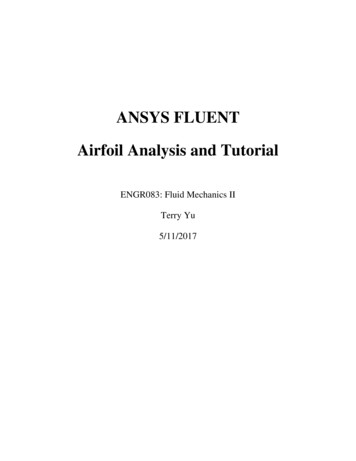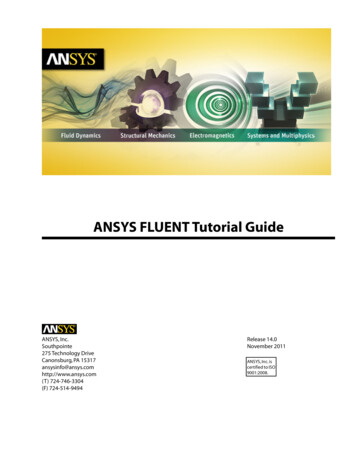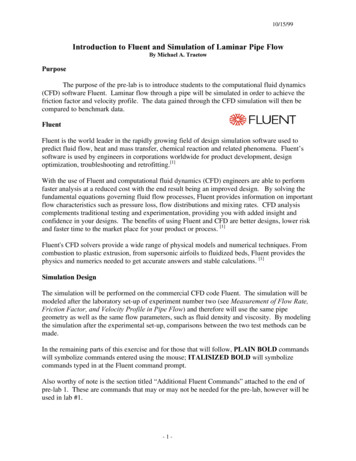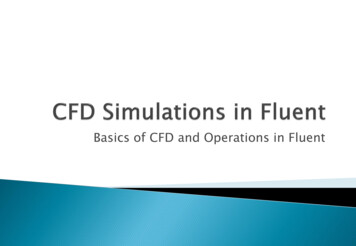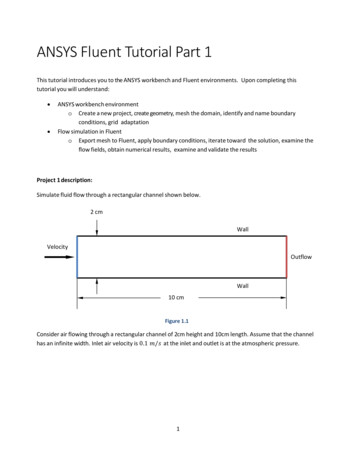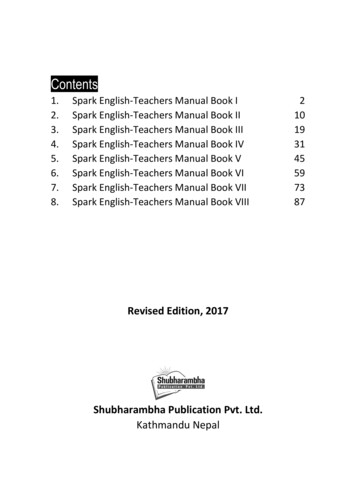
Transcription
Scan and OCR by maillo
LIVING LANGUAGEFLUENTEnglishWritten byBarbara RaifsniderEdited byChristopher A. WarnaschScan and OCR by maillo
ContentsIntroductionLESSON 3WHAT WOULD YOU LIKE TO DO? 21LESSON 1HOW LONG HAVE YOU BEEN HERE? 11ASay It Clearly!: Pronunciation of-ed Ending11CEnglish At Work: Dialogue – MakingSmallTalk 1Build Your Vocabulary 21DEnglish Under the Hood:1B3ASay It Clearly!: Reductions 213BEnglish At Work: Dialogue -Would YouMind if I Looked at Your Resume? 213CBuild Your Vocabulary 223DEnglish Under the Hood:1. Questions and Negatives in the SimplePast Tense 242. The Past Habitual: Used to, Didn't Useto, and Would Always 241.The Present Perfect Tense vs. TheSimple Past Tense 33. Making Polite Requests 263EPhrasal Verbs with work 273F3.Using/or and since with the PresentPerfect and Simple Past Tenses 5Real English: Put Your Nose to theGrindstone 283GBring it All Together 281EPhrasal Verbs with pick 63HListen Up! 301FReal English: See You Later! 63IWhy Do They Do That? ShakingHands 302.Verbs with Irregular Forms in the Pastand Present Perfect Tenses 41GBring it All Together 71HListen Up! 91IWhy Do They Do That? Greetings andSmallTalk 9LESSON 4LAUGHING ALL THE WAY TO THEBANK 32LESSON 24ASay It Clearly!: Y-Vowel Link 32DON'T GO AWAYI 114BEnglish At Work: Reading - Banks in theU.S. 324CBuild Your Vocabulary 332ASay It Clearly!:-s Endings 112BEnglish At Work: Recorded Message— TheHotel Royale 114DEnglish Under the Hood:2CBuild Your Vocabulary 111. Simple Future vs. Immediate Future 342DEnglish Under the Hood:2. The Present Continuous and SimplePresent to Express the Future 351. -s Endings in the Third PersonSingular 143. The Simple Present Tense withPrepositions of Time 352. The Negative Simple Present Tense 143. Questions in the Present Tense 154EPhrasal Verbs with pay 36Phrasal Verbs with turn 164FReal English: In the Black 36Real English: Hold On! 174GBring it All Together 37Bring it All Together 174HListen Up! 392HListen Up! 194IWhy Do They Do That? Debt 392IWhy Do They Do That? Americans on theMove 192E2F2G
LESSON 52. Degrees of Certainty in the PastTense 64THE CUSTOMER'S ALWAYS RIGHT! 415ASay It Clearly!: W-Vowel Link 413. Degrees of Certainty in the FutureTense 655BEnglish At Work: Dialogue - Did YouNeed Some Help? 4Phrasal Verbs for Giving and Getting 665CBuild Your Vocabulary 425DEnglish Under the Hood:1. Prepositions of Time, Motion, andLocation 43Real English: Keeping in Touch withFriendly Advice 67 Bring it All7GTogether 68 Listen Up! 707HWhy Do They Do That? Benjamin Franklinand the American Work Ethic 702. Adjectives Followed byPrepositions 44LESSON 83. Verbs Followed by Prepositions 455EPhrasal Verbs for Shopping 465FReal English: Shop Till You Drop! 475GBring it All Together 47YOUR RIGHTS ANDRESPONSIBILITIES728ASay It Clearly!: Consonant-ConsonantLinking 2 725HListen Up! 498B5IWhy Do They Do That? Service with aSmile 50English At Work: Dialogue - Do You KnowWhy I Pulled You Over? 728CBuild Your Vocabulary 738DEnglish Under the Hood:1. The Passive Voice in the Simple Presentand Present Continuous Tenses 75LESSON 6I HAVE GOT TO HAVE A NEW CAR! 516ASay It Clearly!: Consonant-Vowel Link 512.The Passive Voice in the Present Perfectand Simple Past Tenses 756BEnglish At Work: Dialogue - Let's GoLook at My New Car. 513.The Passive Voice in the Simple Futureand Immediate Future Tenses 766CBuild Your Vocabulary 526DEnglish Under the Hood:8F1. Modals of Necessity 538GBring it All Together 782. Modals of Advisability 548HListen Up! 803. Negative Modals 548IWhy Do They Do That? Some ImportantDriver's Responsibilities 806EPhrasal Verbs with come 556FReal English: I Need SomeNew iWheels! 576GBring it All Together 576HListen Up! 596IWhy Do They Do That? Americans andTheir Cars 59Phrasal Verbs for Criminal Acts 76Real English: You're Busted! 77LESSON 9THIS IS PARADISE, ISN'T IT? 89ASay It Clearly!: Intonation in TagQuestions 829BEnglish At Work: Reading - Aloha fromHawaii! 82LESSON 79CBuild Your Vocabulary 83PUSHING THE ENVELOPE 619DEnglish Under the Hood:7ASay It Clearly!: Consonant-ConsonantLinking 611. Tag Questions 847BEnglish At Work: Reading - A BriefHistory of Mail Delivery in the U.S.A. 613. Beginning Sentences with NegativeAdverbs 862. Negative Questions 867CBuild Your Vocabulary 629EPhrasal Verbs with look 877DEnglish Under the Hood:9FReal English: Your Island Getaway 881. Degrees of Certainty in the PresentTense 63
9 G Bring it All Together 88LESSON 129 H Listen Up! 90SHE'LL WIN BY A LANDSLIDE! 1149 I Why Do They Do That? Travel inAmerica 9112 A Say It Clearly!: Consonant Clusters 11412 B English At Work: Reading-America Divided,But Always United 11412 C Build Your Vocabulary 115LESSON 10TAKE ME OUT TO THE BALL GAME! 9212 D English Under the Hood:1. The Progressive Form of Modals 11610 A Say It Clearly!: Intonation in Questions inStatement Form 9210 B English At Work: Dialogue-It's a GreatDay for Baseball! 9210 C Build Your Vocabulary 932. The Use of would rather 1173. Past Ability 11812 E Phrasal Verbs for Winning and Losing11812 F Real English: Does She Have What itTakes? 11910 D English Under the Hood:1. Reported Speech: Past, Present, andFuture 942. Using Modals in Reported Speech 953. Questions in Statement Form 9612 G Bring it All Together 11912 H Listen Up! 12212 IWhy Do They Do That? Religion in theU.S. 12210 E Phrasal Verbs with keep 9710 F Real English: A Day at the Races 9710 G Bring it All Together 98LESSON 1310 H Listen Up! 100PRIDE OF OWNERSHIP10 I12413 A Say It Clearly!: Reductions with should,could, and would 124Why Do They Do That? The SuperBowl 10013 B English At Work: Dialogue — Who NeedsBuyer's Remorse? 12413 C Build Your Vocabulary 125LESSON 11SNAIL MAIL JUST WON'T CUT IT!10313 D English Under the Hood:1.Past Forms of should and shouldn't 12611 A Say It Clearly!: The Vowels in seat andsit 10311 B English At Work: Reading — A BriefHistory of the Internet 10311 C Build Your Vocabulary 10411 D English Under the Hood:1. The Present Perfect Tense vs. ThePresent Perfect Progressive Tense 1052. The Present Perfect ProgressiveTense vs. The Past PerfectProgressive Tense 1073. The Future Progressive Tense 10711 E Phrasal Verbs for the Computer 10811 F Real English: Life Online 1092.Be supposed to and be to 1273.Making Suggestions with could 12713 E Phrasal Verbs for Buying and Selling aHouse 12813 F Real English: Real Estate 12913 G Bring it All Together 12913 H Listen Up! 13113 IWhy Do They Do That? The AmericanDream of Home Ownership 132LESSON 14HIT THE BOOKS!13411 G Bring it All Together no14 A Say It Clearly!: The Preposition to 13411 H Listen Up! 11214 B English At Work: Dialogue - He's AlwaysBeen a Good Student! 13411 IWhy Do They Do That? The InternetGeneration 11214 C Build Your Vocabulary 13514 D English Under the Hood:1. Verbs Followed by Infinitives 137
2. Adjectives Followed by Infinitives andIt Plus Infinitive 13816 G Bring it All Together 1623. Verbs Followed by Nouns or PronounsPlus Infinitives 13916 I16 H Listen Up! 164Why Do They Do That?WatercoolerConversations 16514 E Phrasal Verbs for School 14014 F Real English: Life on Campus 14014 G Bring it All Together 141LESSON 1714 H Listen Up! 14314 IWhy Do They Do That? AmericanTeachers 143LESSON 15LET'S GET TOGETHER SOMETIME!145THIS DIET MAY WORK FOR YOU! 16617 A Say It Clearly!: Consonant Clusters with /and r 16617 B English At Work: Dialogue — What areYou Going to Get? 16617 C Build Your Vocabulary 16717 D English Under the Hood:15 A I Say It Clearly!:The Vowels in pull andpool 1451. The Real Conditional in the Presentand Future 16815 B English At Work: Dialogue — Who's That2. The Unreal Conditional in the Presentand Future 169Over There? 14515 C Build Your Vocabulary 14715 D English Under the Hood:3. The Past Unreal Conditional 17017 E Phrasal Verbs about Food 1701. Verbs Followed by Gerunds 14917 F Real English: This is Your Cup of Tea2. Verbs Followed by Prepositions andGerunds 1491713. Go plus Gerunds 15017 H Listen Up! 17415 E Phrasal Verbs about Relationships 15117 G Bring it All Together 17217I15 F Real English: She's a Real Knockout! 152Why Do They Do That? FoodManners 17415 G Bring it All Together 15215 H Listen Up! 154LESSON 1815 I Why Do They Do That? Drop byAnytime! 154LESSON 16WATERCOOLER CONVERSATIONS156GET INTO SHAPE! 17718 A Say It Clearly!: Linking Reductions with d,t, s, or z 17718 B English At Work: Dialogue-Let UsDesign a Fitness Program for You! 17718 C Build Your Vocabulary 178 18 D EnglishUnder the Hood:16 A Say It Clearly!: The Vowel Sound inman 1561. Implied Conditionals 1992. Using wish in Conditionals 18016 B i English At Work: Dialogue - What DoYou Think About the New Boss? 1563. Using would to Make Wishes 18116 C Build Your Vocabulary 15718 E Phrasal Verbs for Health and Fitness 18216 D English Under the Hood:18 F Real English: You're the Picture ofHealth! 1831. Passive and Past Forms ofInfinitives and Gerunds 1582. Passive Infinitives and Gerundsafter need 1603. Using Possessives to ModifyGerunds 16016 E Phrasal Verbs with take 16116 F Real English: I Really Work My TailOff! 16218 G Bring it All Together 18318 H Listen Up! 18518 IWhy Do They Do That? The FitnessCraze 186
LESSON 192.Verbs of Perception 202911, EMERGENCY! 1883.Reflexive Pronouns 20319 ASay It Clearly!: Dropping Syllables 18820 E Phrasal Verbs with get 20419 BEnglish At Work: Dialogue - Isn't This anEmergency? 18820 F Real English: Shooting the Breeze 20519 CBuild Your Vocabulary 18920 H Listen Up! 20819 DEnglish Under the Hood:20 I Why Do They Do That? Body Language,Personal Space, and More 2081.Indirect Objects as PassiveSubjects 1912.The Stative Passive 1913.Common Uses of Get 19219 EPhrasal Verbs Related to20 G Bring it All Together 205APPENDIX AIRREGULAR VERBS 211Emergencies 19319 FReal English: Keep Your Cool! 19419 G Bring it All Together 19419 HListen Up! 19619 IWhy Do They Do That? HMO's vs. theFamily Doctor 197APPENDIX BADJECTIVES FOLLOWED BYPREPOSITIONS 213APPENDIX CLESSON 20VERBS FOLLOWED BYPREPOSITIONS 214JUST SHOOTING THE BREEZE 19920 ASay It Clearly!: English Intonation 19920 BEnglish At Work: Dialogue - A Block Party19920 CBuild Your Vocabulary 20020 DEnglish Under the Hood:1. Participial Adjectives 201APPENDIX DREAL ENGLISH IDIOMS 215INDEX221
INTRODUCTIONFluent English is a high intermediate-/advanced-level course in English as a second orforeign language. It is designed to meet the needs of the intermediate-level student invocabulary, grammar, listening comprehension, idiomatic usage, and pronunciation. Itoffers a great deal of practice in each of these areas, through both written exercises andrecorded materials. The language used in this course is realistic and practical, and thesituations in each of its twenty lessons offer a cultural context that will be recognizableand relevant to most intermediate-level students of English.The course is divided into twenty lessons covering a range of topics from small talk andsocial situations, to telephones and business meetings, to computers, politics, and theInternet. Each lesson offers essential vocabulary related to its topic, as well as importantphrasal verbs and idiomatic expressions that are typically challenging to the intermediatelevel student. The lessons are divided into ten sections, each of which focuses on adifferent English language skill: Say It Clearly! The first section of each lesson is a recorded pronunciation andintonation warm-up. These sections focus on aspects of pronunciation andintonation that are typically challenging for intermediate students of English —consonant clusters, linking, reduced English, challenging sounds, etc. English at Work. The second section of each lesson features English in realisticcontexts, ranging from dialogues to recorded messages to readings. The Englishat Work section is the cornerstone of each lesson, where the importantgrammatical structures and vocabulary are demonstrated. These sections are allrecorded, giving the student an opportunity to hear and model native speakers. Build Your Vocabulary. The vocabulary section of each lesson includescertain vocabulary from the English at Work section as well as other generalvocabulary related to the topic of the lesson. Each word or expression isdefined in simple English, and an example is given to show realistic usage. English Under the Hood. Each lesson focuses on three important grammaticalstructures. Explanations are complete and straightforward, and plenty of examplesare given to demonstrate each construction in context. Each grammatical point isalso followed by a practice drill, giving the student a chance to practice and checkcomprehension. Phrasal Verbs. Each lesson includes a list of important and common phrasal verbscentered either on a common base verb, such as take or get, or a particular theme.Each phrasal verb is clearly defined, and examples of usage follow each definition. Real English. Important idiomatic expressions related to the topic or theme ofeach lesson are included in the Real English section. This section is in the formof a short paragraph, where idiomatic expressions are used in context. Thestudent should be able to understand the meaning of each expression fromcontext, but each idiom is also defined in an appendix at the back of the book. Bring it All Together. Each lesson also includes five comprehensive reviewexercises. The first exercise focuses on the vocabulary from the lesson, the nextthree focus on
the grammar and structure, and the last one focuses on the phrasal verbs introduced inthat lesson. Listen Up! Each lesson includes a recorded listening comprehension exercise. Thestudent is directed to listen to a short article or dialogue on a topic related to the lesson,and then to answer questions written in the book. The Listen Up sections are designedto use both vocabulary and idiomatic expressions related to the theme of the lesson. Why Do They Do That? Each lesson includes a culture note that explains an aspect ofAmerican culture related to the lesson's topic. These aspects of culture range from tablemanners to home ownership to driving habits to proper behavior while being pulled overfor speeding. The culture notes are designed to be both interesting and relevant to thestudent's experiences. Answer Key. Each lesson also includes a key to all exercises.KEY TO SYMBOLSWhen you seePLAY CD and listen to the examples or exercises on the audioportion of the course.When you seePAUSE CD and return to the book until you seethe next
Leessoon 1How Longg Have Youu Been Herre?ARRE YOU READYY FOR THE LESSSON?Lessson 1, How Lonng Have You Beeen Here?, will taake you somewwhere you may know veryweell: the INS officee. You'll listen inn on a conversaation between twwo people waitinng in line,which is somethingg people unfortuunately do very often, and whicch is also a situaation inwhich Americans likelto make "smmall talk."Then, you'll learn somme vocabulary thhat will comein handyhat the INSS or anywhere youy have to fill outo forms. But thhat's not all. Lessson 1 alsoinccludes: Thee Present Perfecct Tense vs. Thee Simple Past Teense Using/or and sincce with the Preseent Perfect anddSimmple Past Tensses Phrasal Verbs withh pick Idioomatic Expresssions for Sayingg GoodbyeFinnally, at the end of the lesson you'll read a culture note about casualcgreetings andacqquaintances. Buut let's start withh a pronunciation warm-up. Reaady?1A SAAY IT CLEARRLY!Turn on your CD tot review the proonunciation of-eed, a very imporrtant ending inEnnglish.1B ENNGLISH AT WORKWDiaalogue: Makingg Small TalkSergei, a Russian immigrant, is waitingwin line att the INS. The line is very long, and it'smooving very slowly. Peter, an Ammerican standinng in front of Seergei, turns aroound andstriikes up a conveersation. Sergei is surprised by his eiI guess we didn't havee anything elsee to do today, didd we?Sergei What?I said I guessgthey thinnk that we didnn't have anythiing else to do today.tIt'sjust thaat we've been inn this line for a very long time. lt seems likee wearen't goingganywheree very fast.Yeah. I know. I've been here since about 9:30. Whaat about you?I think I got here just a few minutes before you didd. I decided to pickpup agreen-ccard applicationn for my wife. I should've gottten it off the Innternet.That waay I could havee just stayed hoome. Say, where are you fromm?Me? I'mm from Russia.Oh, wheereabouts?I lived inn Moscow for mostmof my lifee, but I moved around a little. I was inthe military.
2 FLUENT rSergeiIntteresting. I've nevernbeen to RRussia, but I'vee always wanteed to visit.It seemsslike succh an interestinng country. How long have yoou livedheere?I'vve lived in San Diego for only a few weeks, butb I've been inn the U.S.sinnce August.Weell, welcome too San Diego. I gguess the weather must be a bitwaarmer than wheere you're fromm, huh?Yees, that's true. I've gotten useed to it.Haave you visitedd the zoo or Baalboa Park yet?Noo, but I really wantwto go to Baalboa Park. I'vee heard about all thefloowers and musseums that are there.neext!Heey. That's me. GottaGgo. See yyou around.Ohh. OK. See youu.1C BUILDBYOURR VOCABULLARYPerhaps you neednto go to thee I. N. S. to fill oout some forms. Here are somee terms youwould see if yoou were to fill ouut an applicationn to register for permanent residdence.Many of these words have othher meanings, bbut these are thee usages you willw see on I.N. S. forms and other legal doocuments.To be cited. ToT be summoned to appear in ccourt. The policee could cite youu for litteringif you throw traash out of your car.cTo be indictedd. To be chargeed with a crime. Richard Haywaard was indictedd forespionage wheen he was caugght selling U.S. ddocuments to a foreign governmment.Ordinance. A law or regulatioon, usually passsed by a local goovernment. Thee citycouncil passedd an ordinance permittingpthe uuse of marijuanaa by cancer patients.Beneficiary. A person who is or will be the reecipient of someething of value fromfsomeone who has died. Harolld and Gerry weere the sole benneficiaries of theeir mother'smodest estate.Rehabilitationn. Treatment to help someone rreturn to regular, acceptable, oro normalbehavior or abilities. Recoveryy from drug abuuse or physical injuries. It was difficultdtoconvince the governorgthat Saam had been suuccessfully rehabilitated and waas ready toleave jail and returnrto societyy.Clemency. A lesserlpenalty thhan what a court originally sugggested. Thinking thatRalph Smith haad suffered enoough for the crimme he committed, the judge graanted himclemency and gave him a shoorter prison senttence.Amnesty. A paardon given to a large group off individuals. Thhe governmentgranted amnessty to all illegal immigrantsiwhoo had come to workwin the fieldss.Procure. To obtain, to buy, too take possessioon of somethingg of value. ProfeessorHodges wanteed to procure some ancient artiffacts before retuurning from his sabbaticalsin Africa.To engage in. To become invvolved in something, to do something. Teresa wouldnever engage in illegal activitiies, even if she disagreed with a law.To induce. Too influence someeone to do something. Robbie'ss older brother inducedihim to steal mooney from their parents.
Lesson 1: How Long Have You Been Here?3To conspire. To plan together in secret to do harm. Kathy and Jane conspired to makeMary look foolish.To solicit. To ask for something of value, usually money. Raymond got a job solicitingmoney for his political party.To sabotage. To destroy or cause to fail. The lab technician sabotaged the experimentby deliberately mixing up the samples.Espionage. Spying. Espionage was a common practice during the Cold War, and it stillis today.Affiliated. To be in close connection. The local television stations are all affiliated withmajor networks.To persecute. To harass, to cause someone to suffer because of a belief. Many peoplehave come to the United States because they were persecuted in their countries.To incite. To move to action, to cause. The Prime Minister's latest announcement incited theprotesting crowd to become violent.Fraud. A false claim, trick; a liar or imposter. Sam Jameson created a false medicallicense and began practicing medicine until he was exposed as a fraud.Waiver. A document that gives up a right or grants unusual permission to someoneelse. Juan signed a waiver giving his doctor the right to send his medical records to hisinsurance company.Custody. Having legal guardianship of a child or children, often part of a divorcesettlement. When the Camerons divorced, Mrs. Cameron received custody of bothchildren, and her husband won weekend visitation rights.1D ENGLISH UNDER THE HOODTOPIC 1: The Present Perfect Tense vs. the Simple Past TenseLet's take a look at the two most common past tenses in English: the present perfect tenseand the simple past tense.Present Perfect/ have spokenSimple PastI spokeyou have spokenyou spokehe, she, it has spokenhe, she, it spokewe have spokenwe spokethey have spokenthey spokeAs you can see, the present perfect tense is formed with the verb to have and the pastparticiple of the main verb, in this case, spoken. The simple past tense is just the past form ofthe verb, which in this case is spoke. These tenses are used a bit differently. The presentperfect tense expresses an event that happened in the past when the exact time is notknown, or when there's a result or a connection being made to the present, or when the timereference is still unfinished, as in so far this week, or up to now, or during my entire life.Thesimple past tense, on the other hand, expresses an action that happened when a specificfinished time is given, such as yesterday or last
4FLUENT ENGLISHweek or in 1995. Sometimes these tenses are interchangeable, depending on what the speakerwishes to emphasize. Here are a few examples.Julia has returned from her trip. (No specific time is given or is important, and the speaker isemphasizing that Julia is now home.)Julia returned from her trip. (Perhaps this is part of a longer narration of events in the past.)I finished reading the novel last night. ("Last night" indicates a specific time in the past.)Has Pam ever been to New York? ("Ever" means "during her entire life.")/ worked five days last week. ("Last week" is finished time.)So far this week I've worked three days. ("This week" is unfinished time.)PRACTICE EXERCISE 1: Complete each of the following sentences with either the presentperfect or simple past tense.1. (drive) Maryher new car to Santa Barbara yesterday.2. (not try) Sam on his new pants yet.3. (buy) We a new house last week.4. (eat) you ever fried bananas?5. (not go) Mr. and Mrs. Denton out of town last weekend.6. (see) I neverThe Birds.7. (not speak) Hemuch English during his trip last April.8. (miss) youme while I was gone?9. (dance) you ever the salsa?10. (get) Richarda new car last week.TOPIC 2: Verbs with Irregular Forms in the Past and Present Perfect TensesA lot of common verbs have irregular simple past and past participial forms. Here are some of themore common ones. You'll also find a list of all of the most important irregular verbs in theappendix on page 211.PresentbebeginPastwas/werebeganPast nsingspeaksangspokesungspoken
Lesson 1: How Long Have You Been Here?takewritetookwrote5takenwrittenPRACTICE EXERCISE 2: Complete each of the following sentences.1. (sing) Who that last song?2. (do) Sarah her homework last night.3. (be) Where you at breakfast?4. (begin) Madeline already her new job.5. (know) Henry all of the answers.6. (write) you that letter yet?7. (begin) Angel his university education last spring.8. (sing) She in Las Vegas many times.9. (see) anyone really ever Big Foot?10. (take) I had a headache, so I some aspirin.TOPIC 3: Using for and since with the Present Perfect and Simple Past TensesUse since when a specific point in time is given. Use/or when a period of time, ratherthan a specific point in time, is given.Since.yesterdayFor.one daylast weeklast montha weekthree monthsRichard has lived in Chicago since 1985.Richard has lived in Chicago for twenty years.Notice that you can use for and since with either the simple past tense or the present perfecttense, depending on whether or not the action is still happening.I've worked for Green Enterprises for three years. (I still work there.)/ worked for Green Enterprises for three years. (Now I work somewhere else.)PRACTICE EXERCISE 3: Complete each sentence with either since or for.1. We've lived in Los Angeles before Barry was born.2. We've lived in Los Angeles ten years.3. There's been a roadblock on the freeway three days.4. I haven't seen you I was in high school.5. Why haven't you called two weeks?6. Susan hasn't gone to work last Tuesday.7. They stayed at this hotel three nights.8. Roger and Martin have been gone hours!9. Have you been waiting for me 7:30?10. She hasn't spoken to me the night we got into an argument.
6 FLUENT ENGLISH1E PHRASAL VERBS WITH PICKPick up.a) To take something up off of a surface. Pick your coat up off the floor.b) To meet and collect a person from a specific location. Who's going to pick Henry up atthe airport?c) To buy something Jordan picked up some milk on the way home.*Note that to pick up a person can also mean to meet someone, usually at a public place such as a bar ornight club, and to become sexually involved with him or her after spending only a short time together.Pick out.a) To select, to choose. Melissa picked out a shirt and brought it to the dressing room.b) To separate from. If you break a wine glass, make sure you pick all of the glass out of thecarpet.Pick over.To take the best of something and leave what is not so good. The shirts have been onsale so long that they've really been picked over.Pick on.To tease. My sisters and brothers always picked on me because I was the youngest.Pick from.To choose from a group of something. Mrs. Stefanson picked a new assistant from thegroup of applicants for the job.Pick at.a) To take only very small amounts of food. Jessica ate almost everything on her plate, butshe only picked at her peas.b) To scratch or irritate something, such as a cut or scrape. Don't pick at that cut! Let it heal.Pick up on.To understand something, especially something that isn't intended to be understood.They spoke in Spanish in front of Dorothy, so she didn't pick up on what they weretalking about.*Note that pick up, pick out, pick from, and pick over are separable. This means the two words can beseparated and a pronoun or noun can be inserted between them. Billy picked out the raisins or Billy pickedthem/the raisins out, but not Billy picked out them. Pick on, pick at, and pick up on are not separable. Youcannot separate the verbs from the prepositions.1F REAL ENGLISHSEE YOU LATER!Saying "good-bye!" is only one way to end a conversation. There are a lot of idiomaticexpressions that people use when a conversation is over or when they have to leave.Here are some important ones, listed from most to least formal: Have a good day. Takecare. Take it easy. (I'll) See you later. (I'll) See you around. See ya! Catch you later. Gotta go.Note that these expressions are often preceded with Well. Well, have a nice day!
Lesson 1: How Long Have You Been Here?71G BRING IT ALL TOGETHERNow let's review everything we've covered in this lesson.REVIEW EXERCISE 1: VocabularyPlace the correct vocabulary word in each space. Use each of the following wordsonce: solicit, beneficiary, indicted, procured, waiver, persecuted, incited, affiliation,espionage, amnesty, conspired, rehabilitation, clemency, sabotage, cited, induce,fraud, custody, ordinance, engaging.1.When we found out that Dr. Wells hadn't gone to medical school, we knew he was a.2.Learning new skills is essential to the successful from a life of crime.3.For some people, working is much harder than in crime.4.The well-knownInternational is an organization dedicated to encouraginggovernments to free their political prisoners.5.Bill Jackson feltbecause he had received a dishonorable discharge from the army andfew employers would hire him.6.The soldiers sneaked in behind enemy lines to the next shipment of weapons.7.by jealousy, Roberto accused his wife of having an affair.8.If you let your dog walk around without a leash, you are violating a city.9.I want to show you some new gems we've recently .10. The senator was forced to resign when his with a racist organization was uncovered.11. A sixteen-year-old cannot attend adult school without afrom high school.12. Tammy went to several companies to money so that she could afford to travelto the swimming competition.13. Ralph was for breaking and entering.14. Mary was for driving with her lights off.15. The Rangels filed for of their daughter's son.16. A governor has the power to giveto a condemned criminal, commuting a deathsentence to life in prison.17. The boys to scare all the girls in class on Halloween.18. Wiretaps were placed on the ambassador's phone line in an act of.19. Tony named his wife, Susan, as the on his life insurance policy.20. The labels of many poisonous products warn not to vomiting in case ofaccidental ingestion.REVIEW EXERCISE 2: The Present Perfect Tense vs. the Simple Past TenseComplete each of the following sentences with the corre
5 Together 68 Listen Up! 70D English Under the Hood: 1. Prepositions of Time, Motion, and Location 43 2. Adjectives Followed by Prepositions 44 3. Verbs Followed by Prepositions 45 5 E Phrasal Verbs for Shopping 46 5 F Real English: Shop Till You Drop! 47 5 G Bring it All Together 47
